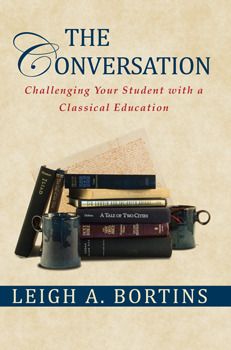This book is broken up into two parts. Part 1 is "High School at Home" and Part 2 is "The Rhetorical Arts."
Part 1
This section gives you insights on how your day might be scheduled, answers questions on socialization, and helps combat some of the inadequacies parents often feel as they head into the high school years. Rhetoric is also defined in this part of the book and continued all though out. The classical model contains three stages of progression as we learn something new - grammar, dialectic, and rhetoric. The grammar and dialectic stages often go along with elementary and middle school ages although depending upon the child and what is being learned, the stages can hit at different ages.
Often times though, once your child has reached high school age, they have memorized facts, learned the vocabulary, asked the questions, researched, and analyzed other's ideas. So, after that they are ready to move on to sharing what they've learned and presenting their own ideas (aka The Rhetoric Stage).
This sections also defines the five cannons of the rhetoric which are Invention, Arrangement, Elocution, Memory, and Delivery. There is a great chart inside the book that greatly breaks each of these canons down by giving you a question and action for each one.
Part 2
This is where "the meat" of your book takes place. In the chapters of this section, Ms. Bortins guides you along 9 subject areas that your high schooler is most likely to encounter by giving you examples of conversations, questions to ask, and projects that she has seen work in her own environment. Subject areas include Reading, Speech and Debate, Writing, Science, Math, Government and Economics, History, Latin and Foreign Languages, and Fine Arts. If you are familiar with The Core or The Question, this section follows along those same formats but is directed completely to the rhetoric stage. She also has included games you can play showing that conversing doesn't have to be boring but can be fun too.
Ms. Bortins ends the book answering questions about graduation that she has received from parents and shares great wisdom and encouragement for parents who are seeking to educate their children at home. My favorite quote was, "Education is not about the individual but about the family of God building His kingdom on earth. It is about legacy and heritage." I could not agree more. That is what I want my children's education to look like in the end.
Our homeschool is what I would consider a eclectic Christian classical family. With my oldest, we did not start a classical education until later in his middle school years and I can really see the difference of starting at the beginning versus starting late. However, I do not think it is ever too late and Ms. Bortins agrees. I, myself, am learning just as much as my children! If the individual has the desire to learn, that is all it takes.
Even if you do not define your homeschool style as entirely or even partially classical, I believe this is a great read for all parents. It gives you great insight on having rich conversations with your child once they reach the rhetoric stage (high school). It also provides practical tips on staying the course of educating at home during the high school years which is needed for all! I am so grateful for those who have gone before me and are willing to share, encourage, and inspire through their own journeys. You will find all of that plus practical steps to implement in your homeschool as well as great questions to get you started with those rich conversations right away!
Find out more about Classical Conversations and The Conversation by visiting the following:
Facebook: https://www.facebook.com/classicalconversations
Twitter: https://twitter.com/classicalconv
Pinterest: https://www.pinterest.com/classicalconv/
Google+: https://plus.google.com/117616164250444350670/posts
YouTube: https://www.youtube.com/user/ClassicalConv





No comments:
Post a Comment
Thanks for stopping by - let me know that you did!